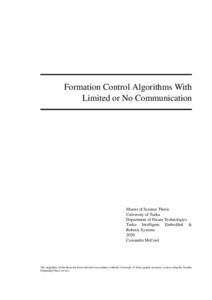Formation Control Algorithms With Limited or No Communication
Mccord, Cassandra (2020-07-10)
Formation Control Algorithms With Limited or No Communication
Mccord, Cassandra
(10.07.2020)
Julkaisu on tekijänoikeussäännösten alainen. Teosta voi lukea ja tulostaa henkilökohtaista käyttöä varten. Käyttö kaupallisiin tarkoituksiin on kielletty.
avoin
Julkaisun pysyvä osoite on:
https://urn.fi/URN:NBN:fi-fe2020100277783
https://urn.fi/URN:NBN:fi-fe2020100277783
Tiivistelmä
Formation control refers to a collective behaviour of multi-agent systems where individual agents come together to form a pattern, often geometric. These formations can enable multi-agent systems to function more effectively in a broad range of applications. Many formation control algorithms require centralized decision making, communication between agents or a centralized decision maker and other factors that increase per-agent cost and reduce the robustness and scalability of multi-agent systems. To this end, we introduce two algorithms that operate using local decision making and limited or no communication. The first algorithm is a communication-free and index-free algorithm based on polar indicator distributions. The second is a progressive assignment algorithm using limited, situated communication that deterministically assigns agents a position in the objective formation along a convex spiral directed path graph. We also present an extension of the second algorithm for 3-dimensional formation definitions. The first algorithm is demonstrated in a physical experiment using ground-based agents while the second one is simulated using micro air vehicles (MAVs) in a physics-based simulator.
Samankaltainen aineisto
Näytetään aineisto, joilla on samankaltaisia nimekkeitä, tekijöitä tai asiasanoja.
-
Management control in exploitation, exploration and organizational ambidexterity – The use and formalization of management control systems as antecedents for different modes of innovation
Manneri, Ville (Turun yliopisto. Turun kauppakorkeakoulu, 19.10.2016)This study examines the relationship between management control and different modes of innovation – exploitation and exploration. Exploitation refers to the refinement of the existing competencies of an organization and ... -
Rural crime control – thematic analysis on discussions and perceptions of rural crime control in Finland
Nieminen, Sanni (08.09.2021)The study observes discussions and understanding of rural crime control in chosen public documents of the Finnish Ministry of the Interior and the National Police Board of Finland. The aim of the analysis is to observe how ...suljettu

